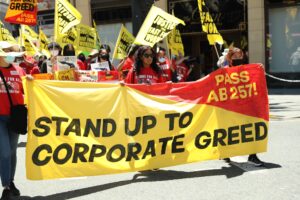[Elon Musk entering stage in a cowboy hat, pumping fists, etc, launching the Gigafactory]
[Elon Musk speaking on stage with the cowboy hat]: It wasn’t easy building this humongous building and getting all this equipment here.
Luis [In Spanish]: The blades moved and that’s where I got crushed metal to metal, by the blades, you know? It was but an instant, like I said. When I took off my gloves, I saw that my fingers were almost fully mangled.
Hannah Alexander [In Spanish]: There are workers that I’ve spoken to, like Luis, who worked on the site that injured on the site and then whose injuries should appear in these reports per the agreement between Tesla and Travis County and his injury is not there.
[Elon Musk speaking on stage with the cowboy hat]: I just cannot express enough appreciation and gratitude and admiration for the Tesla team that built Giga-Texas. Let’s give ‘em a hand.
Cristina [In Spanish]: I was assigned the work of 7 people. I feel sad, I feel exploited, I felt almost enslaved.
[Elon Musk]: There’s no place like Texas.
Tesla received $60+ million in tax breaks to build its new gigafactory in Texas. The workers who built it suffered abuse exploitation. Now they’re exposing the truth for the first time.
Cristina [In Spanish]: I was charged with doing the stairways of three floors. I cleaned 22 bathrooms, four dining halls, the passageways, the showers, the locker rooms. All that work I had to do in 12 hours, when before it was done by seven people. The truth is I’d get home crawling through the door! Because it was 12 hours that I I had to go around doing everything they asked me to do and they, the supervisors, would be constantly after me. When I complained that it was extremely hot, they came to me and assigned me to the three-story stairs, which had no ventilation. If I’d go to drink water, they would come to tell me no, that I couldn’t waste my time drinking water. Because of that, I suffered a heat stroke. I fainted, right there on the stairwell.. The paramedics arrived, they took me away, my supervisors were notified and [my supervisors were upset the paramedics were called instead of them]. I had fainted! How was I supposed to call them?
Luis [In Spanish]: So practically the accidents that would take place there at Tesla, they would always, the superintendents would pretend like nothing happened. Understand? There was never a report to the contractor, nor to the company. And I told them I didn’t want to leave [the worksite] without submitting a report, and that they had to give me a copy of the report that I was making, and then they walked me off the Tesla worksite, into the parking lot.
County commissioners gave Tesla tax breaks with the hope of bringing “good jobs” to Texas.
Dick Lavine: So Elon Musk has gotten a sweet, sweet deal going in Texas. They located it in a very poor school district that had no bargaining power whatsoever and was just desperate to have a facility be built.
David Chincanchan: Organizers like Workers Defense went and spoke with the commissioners courts about making sure that if they were going to move forward with some kind of economic incentive agreement, that there would be robust worker protections, something like our Better Builder program which includes a standard set of worker protections as well as independent monitoring to make sure that those protections are actually being honored.
Hannah Alexander: Tesla claimed that it would be too expensive for them to do this program that many other corporations, public entities do very regularly. To appease concerns about worker safety, they incorporated some of the standards for better builder into the agreement–but they did not incorporate the third party accredited independent monitoring that is really necessary to enforce a deal like this.
Luis [In Spanish]: At first, when I joined, they gave us safety talks and all that, right? But it was only in the beginning that they gave us those chats upon first joining. Afterwards they never called us again. They wanted the work rushed—get it done as fast as possible, get the job done, and so [safety] trainings were only given once.
Hannah Alexander: Folks were receiving fraudulent documents indicating that someone received training that they were supposed to get for this agreement, but did not actually.
Cristina [In Spanish]: They wouldn’t give me the safety gear I needed. I had to take a lot of construction waste to the dumpster—wood, metals, all sorts of stuff—and there was so much dust. I had to sweep all that dust, and had to fight to be given face masks—they would only give me one face mask. When I would take the face mask off, I had all this dust here in the shape of the mask. The safety chief told me to discontinue sweeping, and that I should demand some of that [suppressional] dust to throw on the floor, you know? I told my boss, and he said no, that he was sorry but they hadn’t counted on all that dust, and that I had to do the job. And so I continued doing the job.
Hannah Alexander: There are workers whose lives were turned upside down, whose lives will not be the same, whose families will not be the same, because workers did not get the training they needed to be safe, as required by Travis County.
Luis [In Spanish]: There’s always secondary health effects. One’s left with the consequences, you know? Sadly, I have some of those. Sometimes my hand goes numb. Part of my shoulder goes numb.
David Chincanchan: We work with a lot of immigrant workers and the threat of retaliation, the threat of losing your job and your livelihood is amplified by the fact that there’s also, you know, the threat of immigration enforcement for you or your family.
Cristina [In Spanish]: After I submitted my complaint, it got worse for me. I finished my shift and I wasn’t fired as my shift ended, but it was the next morning they sent me a message that I had been fired.
Luis [In Spanish]: I tell my co-workers, from reconstruction, that we can’t back down, can’t keep things quiet, because these are abuses that always happen in construction. We as Latinos and as workers, we rise to bring our families’ daily bread, but sometimes there are things that we keep quiet out of fear.
Hannah Alexander: Travis County and other communities across Texas that are contemplating these deals really should utilize their power as a stakeholder to ensure that the people that they represent are actually protected and that truly do benefit from from this agreement and sort of being left out, you know, owed wages and with injuries, some of which may last and have last for the rest of their lives
Cristina [In Spanish]: How is it that he, being a [billionaire], is not interested in the fact that thanks to people like me and many others, he has everything. He has all that treasure thanks to us . And I believe that as humans we deserve respect, deserve consideration, we deserve to have the opportunity to earn well, earn a decent salary.
David Chincanchan: If you are going to be using you know, taxpayer dollars to pay for a corporate project or a corporate expansion or relocation, then that better be something that supports something in the public interest, right? And I think oftentimes that’s talked about, as, you know, creating jobs and opportunities. But I think the question is, well, what kind of jobs are we creating?


